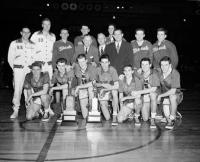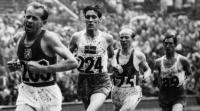Written By: Judge Thomas C. Groton III

The U.S. Basketball team won the Gold, as they had since 1936.


Triple Gold long-distance runner Emil Zatopek of Czechoslovakia.
Editor’s note: As the 31st Games of the Olympiad approaches, August 5-21 in Rio de Janeiro, I thought it would be interesting to resurrect stories of former Olympics as written in Coconut Times in the summer of 1992, year of the Games in Barcelona, Spain.
Helsinki, Finland, is a port city on the Baltic Sea. It is the capital of Finland, the land of lakes and forests. Helsinki contains approximately one-sixth of the Finnish population. It is a relatively new city for Europe in that it was established by King Gustav of Sweden approximately 400 years ago, in order to woo trade from the Estonian city of Tallinn and thereby challenge the monopoly of the Hanseatic League. It contains some of the purest neo-classical architecture in the world. The Finns are a tough and resilient people as demonstrated by the fact that they fought the Soviets to a standstill in the Winter War of 1939-40.
Fittingly enough, in 1952 at Helsinki, the U.S.S.R. joined the Olympics for the first time. It was the height of the Cold War, and many feared a showdown. In an age when sports truly did transcend politics, the Soviet and American athletes got along quite well; and the Olympics were not intruded upon by differing politics. It is remarkable to think that 40 years later, in Albertville, France, at the 1992 Winter Olympics, there was concern because of the collapse of the Soviet Union and the possibility of political protests or dramatic expressions of the new-found freedom by the former Communist competitors.
The world backdrop to the ‘52 games included the Korean War, a Republican ticket of Dwight Eisenhower and Richard Nixon in the U.S. Presidential Election, the death of King George VI of England, and the ascension to the throne of Queen Elizabeth II, the regaining of power by General Batista in Cuba, and the death of Eva Peron.
Headlines read as follows: “Narcotics dealers have fanned out from New York City and are selling drugs to teenagers in cities throughout the U.S. But, today that market took a steep down-turn as federal agents arrested more than 500 dealers nationwide;” “Communist guerillas in Viet Nam have stepped up their attacks on French troops. Cities, especially Saigon, have been disrupted by acts of terrorism;” “a Sub-Committee of the House of Representatives has deplored the proliferation of violent crime shows and omnipresent beer ads on TV;” “the Maryland Chesapeake Bay Bridge, third longest in the world, is open to traffic at a cost of $45 million.”
The sports events of the day included Jackie Robinson becoming the highest paid player in Brooklyn Dodgers’ history; Rocky Marciano knocking out Lee Savold for his thirty-ninth straight victory, and Eddie Arcaro taking an unprecedented fifth Kentucky Derby in the saddle of Hill Gail. 1952 saw the birth of two future athletic greats, James Scott Connors and Bill Walton who would grow to become giants in the sports of tennis and basketball, respectively. Also in that year, Ernest Hemingway’s Old Man and the Sea was published and Gary Cooper appeared in High Noon.
It was fitting, as these Olympics turned out, that the Olympic Torch bearer opening the Helsinki games was none other than “The Flying Finn,” Paavo Nurmi, one of the greatest distance runners in Olympic history. He was the owner of nine Gold medals and several Silver medals. During the time that he was competing, he set 29 world records at distances ranging from 1,500 meters to 20,000 meters. At the time of the 1952 Olympic games, the Olympic stadium in Helsinki was graced with a Bronze statue of Nurmi.
The star of the Helsinki games turned out to be a distance runner, Emil Zatopek. Zatopek, from Czechoslovakia, had competed in the ‘48 games and won a Silver medal in the 5,000 meters and a Gold medal in the 10,000 meters. In ‘62, the 10,000-meter race was run first. The outcome of the race was never in doubt as Zatopek won going away with a cushion of about 100 yards and a time of 29 minutes, 17 seconds.
Next on the agenda for Zatopek was the 5,000 meters. He hoped to become the first runner since Hannes Kolehmainen of Finland to win both the 5,000 and 10,000 meter races. Kolehmainen had performed his double in 1912 in Stockholm. In the qualifying heats, the multi-lingual Czech decided to amuse himself by chatting with the other runners. He took his time to run with and talk to Alesander Anoufriev of the U.S.S.R., Bertil Albertsson of Sweden, and Les Perry of Australia, slowing his pace as was necessary in order to engage the other runners in conversation.
The final was, of course, a more serious affair. Yet, Zatopek still took the time to speak to Herbert Schade before the start, advising him to hold back for the first 2,000 meters and not waste his energy setting the pace. Schade ignored this advice and paid the price. The race itself was full of action, with the lead changing numerous times. As the laps wound down, it appeared that any of five runners could win: Zatopek, Schade, Mimoun, Chataway, or Perry. At the bell, Zatopek was in first place, hard-pressed by Schade.
In the backstretch, Chris Chataway, who later paced Roger Bannister and John lndy to the first two sub-four minute miles, dashed into the lead, followed by Mimoun, and Schade, leaving Zatopek in fourth place. Entering the final curve, Zatopek made his move, swinging wide into lane 3. Halfway through the bend, he was already in front again and pulling away. Entering the home straightaway, Chataway, exhausted, stepped on the curb and fell. He was able to regain his feet and stagger home, but by that time Zatopek had already gained a five-yard victory over Mimoun, becoming the first man in 40 years to win both the 5,000 and 10,000 meters at the Olympics. Not too bad for someone who, upon entering the 10,000 meters, stated that “the marathon won’t be for a long time yet, so I simply must do something until then.”
Zatopek was not yet through. The marathon was part of his program for an unprecedented triple even though Zatopek had never even run the marathon. The fact that he had never run a marathon before bothered him slightly. He wasn’t concerned about coming up with the necessary endurance, but it did worry him a bit that there might be pacing strategies with which he was not familiar. With this in mind, Zatopek decided to run along with the man whom he considered to be the favorite in the race - Jim Peters of Great Britain, who had run the fastest marathon in history only six weeks earlier. Zatopek took note of Pewter’s running number in the newspaper, and the next day he located Peters on the starting line and introduced himself.
Peters took off at what seemed to be an outlandish pace, but Zatopek, as well as Gustaf Jansson, kept contact with him. After 15 kilometers, Zatopek and Jansson caught up with Peters, and the three ran together for a couple of miles.
Then Zatopek turned to Peters and said, in English, “The pace? Is it good enough?”
Peters, who had exhausted himself with his early running, pretended that he was still fresh, and replied, “Pace too slow.”
Zatopek mulled this over for a few moments and then said, “You say, ‘too slow.’ Are you sure the pace is too slow?”
“Yes,” came the reply. They continued on in silence for a short while, and then Zatopek zipped by Peters, taking Jansson with him.
They passed the turnabout together, with Peters ten seconds behind. After 20 miles, Peters developed a leg cramp and dropped out. By this time, Zatopek had shaken off Jansson, and he was able to enter the stadium far ahead of the other runners. The huge crowd greeted him as the hero of the 1952 games, chanting “Za-to-pek, Za-to-pek,” as he completed the final lap. The Jamaican relay team hoisted him on their shoulders and carried him around the field. Zatopek was already signing autographs by the time the next runner, Renaldo Gorno, arrived. Zatopek greeted him at the finish line with a slice of orange.
Although other people may have won more Gold medals in other events in other Olympics, winning three Gold medals in a single Olympiad in the classic long distance running events (5,000 meters, 10,000 meters, and the marathon) was astonishing; a record surely never to be broken.
As phenomenal as Zatopek’s performance was, the Zatopek family was not yet finished. Zatopek’s wife, Dana Zatopkova, born on September 16, 1922, the exact same date as her husband, was competing in the javelin throw. At the time of the competition, Emil had already been awarded one of his Gold medals which Dana placed in her bag and took to the competition for good luck. She set a world record winning a Gold medal, the fourth Gold medal for the Zatopek family in the 1952 Helsinki games.
Although the Zatopeks were the story of the ‘52 Olympics, there were also other noteworthy accomplishments. Twenty-one-year old Bob Mathias of the U.S.A. won the Gold medal for the decathlon with 7,887 points, a world record, having also won the Gold in 1948 in London.
The U.S. boxing team won five Gold medals. Most noteworthy was that of Floyd Patterson, who at 17, won the middle-weight title with a knockout in 74 seconds. Four years later he would knock out Archie Moore to win the vacant heavy weight title.
The U.S. basketball team, of course, also won the Gold medal, as they had done in the Olympics since 1936 (and would continue to do so until 1972 in Munich). Having been crushed by the United States, 86-58, in the semifinal round, the Soviet team decided to freeze the ball in the final match. After ten minutes, the United States led 4-2. At the halftime, the score was still only 17-15. With five minutes left to play, Clyde Lovellette scored a basket to give the United States a lead of 31-25. The next time the Americans got the ball, it was their turn to stall. One Soviet player became so exasperated that he sat down on the floor until his coach ordered him to stand up.
Overall, it was a successful Olympics for the U.S.A., having won a total of 40 Gold medals, 19 Silver medals, and 17 Bronze medals.
«Go back to the previous page.


